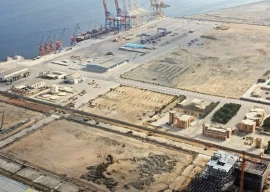
The Punjab environmental tribunal has only disposed of 15 per cent of the cases it has been sent by the Environmental Protection Department in the ten years since it was set up. Just 20 per cent of the total fines handed out by the tribunal to polluters have been collected.
The Express Tribune has learnt that the tribunal has been sent a total of 2,800 cases since 2002, of which it has decided 435, or around 15 per cent, leaving 2,294 cases pending.
The tribunal has announced fines of Rs9.9 million, of which some Rs1.9 million has been collected. The government spends around Rs2.3 million a year on running the tribunal, said Environmental Protection Department Secretary Saeed Iqbal Wahla.
Previously, environmental protection was a federal subject governed by the Pakistan Environmental Protection Act of 1997. The subject was devolved to the provinces via the 18th Amendment to the Constitution, and the Punjab Environmental Protection Act of 2012 replaced the federal law.
Nawaz Manik, the deputy head of the EPD legal department, cited several reasons for the slow working of the environmental tribunal in the past decade. He said the federal government responsible for appointing a tribunal chairman until this year – had often been slow to fill the tribunal.
In the last ten years, the tribunal has been closed for lengthy periods on three occasions for eight month in 2006-07, for six months in 2009, and then from July 2011 till yesterday, when it reopened (see box).
The tribunal chairs the government had appointed had been too old to work quickly, he said. He said that the previous chairman, Khwaja Afzal, had been 87. “The one before him was about the same age too,” he said.
Shaheen Kiran was tribunal chairwoman from 2007 to 2009. Khalid Pal Khawaja (2001-2002) and Syed Zameer Hussain Jafri (2003-2006) also served as chairman. The new tribunal chairman, Abdul Rasheed, is in his 50s, said the EPD secretary.
Manik said that the tribunal had gone easy on polluters. “The department often pushed them to fine polluters but the tribunal members maintained that the environment rules were too strict and that issuing warnings was sufficient,” he said.
He said that the reason most of the fines had not been recovered was that there was no effective collection mechanism. Neither the department nor the tribunal has the authority to recover the fines, he said.
EPD Secretary Wahla said that if a company refused to pay a fine, the department could forward the case to the district coordination officer, who had the authority to take action against polluters. The DCO can get revenue officers to confiscate the property of those who don’t pay, he said. But the EPD had never done this, he said. He added that past officials at the EPD had been incompetent.
The new provincial environmental law actually raised the maximum size of the fine that the tribunal can hand out to polluters from Rs1 million to Rs5 million, but contains no new provisions regarding collection.
Wahla said that the EPD had proposed changes to the new law to make a more effective mechanism for collection of fines, among other things. “Approval and implementation of these changes will take time,” he said.
About 80 per cent of the cases at the tribunal stemmed from complaints lodged to the EPD, while the rest originated from offences spotted by the EPD during inspections. Upon first spotting an infringement, EPD inspectors issue a notice to the company detailing the changes it must make to comply with environmental regulations. Should the company fail to comply with the notice, the case is forwarded to the environmental tribunal.
Akhter H Awan, a lawyer who has argued over 150 cases in the environment tribunal in the past decade, says the reason so few cases are disposed of is loopholes in the legislation.
“Nothing, from the sampling procedures to the laboratory standards, is specified under the law. The tribunal and the EPD are both also unclear about tackling polluters who do not pay the fine or refuse to comply with cautionary measures advised by the court,” he said.
Awan suggested that the EPD consult environmental lawyers about closing the loopholes in the legislation.
Of the cases decided by the tribunal, 65 concerned ‘large-scale’ factories (located on more than 10 kanals), 134 ‘medium-scale’ factories (on 2-10 kanals) and 236 ‘small-scale’ factories (on less than 2 kanals).
Published in The Express Tribune, June 3rd, 2012.





























1713853507-0/MalalaHilary-(2)1713853507-0-270x192.webp)








COMMENTS
Comments are moderated and generally will be posted if they are on-topic and not abusive.
For more information, please see our Comments FAQ